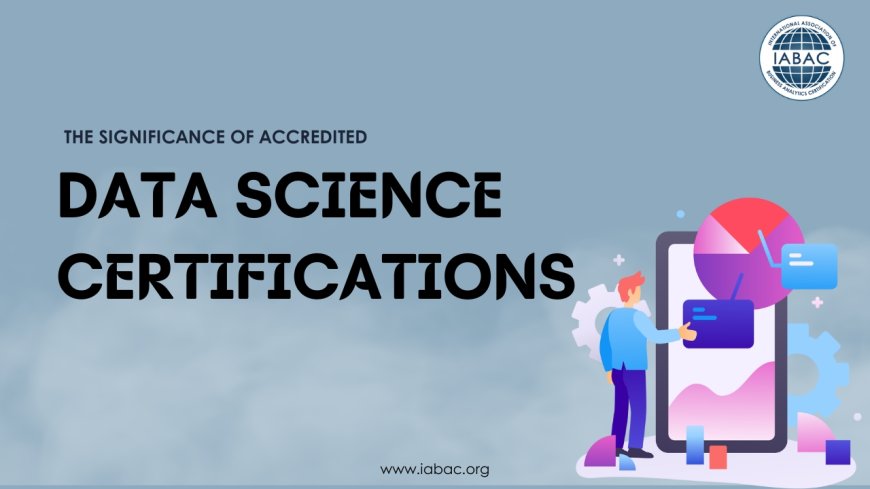The Significance of Accredited Data Science Certifications
Enhance your career with recognized Data Science Certifications. Become an expert in this growing field and boost your credibility. Unlock new job opportunities

Data science certifications refer to formal qualifications awarded to individuals who have demonstrated proficiency in various aspects of data science. These certifications validate the holder's understanding and practical application of key concepts, tools, and techniques within the field of data science. Typically, they encompass a range of topics including statistical analysis, machine learning, data visualization, and programming languages such as Python or R.
Certification programs may vary in duration and intensity, with some offering comprehensive training courses followed by rigorous assessments, while others focus solely on examination-based evaluation. Ultimately, data science certifications serve as tangible evidence of an individual's expertise and competence in leveraging data to derive insights and make informed decisions, thus enhancing their credibility and employability in the competitive job market.
Why Accredited Data Science Certifications Matter?
Accredited data science certifications provide credibility by attesting to an individual's expertise and proficiency in the field. These certifications are typically awarded by reputable organizations or institutions that have established themselves as authorities in data science education and training. By completing a certification program that meets rigorous standards, individuals demonstrate their commitment to continuous learning and professional development. This validation of skills not only boosts the confidence of the certification holder but also instills trust among employers and peers, who can rely on the certification as a reliable indicator of competence.
-
Recognition: Accredited certifications are recognized and respected within the industry, enhancing the credibility of the certification holder.
-
Standardized Curriculum: Certification programs often follow standardized curricula developed by industry experts, ensuring that holders possess a comprehensive understanding of key concepts and methodologies.
-
Quality Assurance: Accreditation bodies assess certification programs to ensure they meet predefined standards of quality and relevance, assuring stakeholders regarding the program's integrity.
-
Employer Trust: Employers value accredited certifications as they assure an individual's skills and readiness to contribute effectively to data-driven projects and initiatives.
-
Peer Recognition: Holding an accredited certification enhances an individual's standing among peers, fostering professional networking and collaboration opportunities within the data science community.
Overall, credibility and validation are essential components of accredited data science certifications, establishing the certification holder as a trusted and competent professional in the field of data science.
What is the importance of accreditation in data science certifications?
Accreditation in data science certifications is vital for ensuring quality, credibility, and standardization within the field. Accredited programs undergo rigorous evaluation to ensure they meet established standards of excellence, providing candidates with a comprehensive and up-to-date education in data science. This accreditation process guarantees that certification holders possess the necessary skills and knowledge to contribute effectively to data-driven projects and initiatives. Moreover, accredited certifications are widely recognized and respected by employers, peers, and industry professionals, enhancing the candidate's employability and professional standing. Overall, accreditation serves as a mark of assurance, signaling to stakeholders that the certification program meets stringent criteria and maintains integrity and relevance within the dynamic field of data science.
Career Advancement Opportunities
Career advancement opportunities in data science are abundant and diverse, offering professionals the chance to continually grow and develop within the field.
-
Specialization: Data scientists can choose to specialize in various areas such as machine learning, data engineering, or business analytics, allowing them to deepen their expertise in specific domains and pursue advanced roles tailored to their interests.
-
Advanced Education: Pursuing higher education such as a master's or doctoral degree in data science or related fields can open up opportunities for leadership positions, research roles, or teaching positions in academia.
-
Certifications: Obtaining advanced certifications in specialized areas of data science can demonstrate expertise and proficiency, enhancing credibility and competitiveness in the job market.
-
Management Roles: With experience, data scientists can transition into managerial or executive roles, overseeing teams and projects, and driving strategic decision-making based on data-driven insights.
-
Entrepreneurship: Data scientists with entrepreneurial aspirations can establish their consulting firms, startups, or tech companies, leveraging their expertise to address specific industry challenges or develop innovative solutions.
-
Continuous Learning: Staying updated with emerging technologies, tools, and methodologies through continuous learning and professional development opportunities ensures data scientists remain competitive and adaptable in a rapidly evolving field.
Overall, career advancement in data science is fueled by a combination of expertise, education, continuous learning, and a proactive approach to seizing opportunities for growth and development within the dynamic landscape of data-driven industries.
Future of Data Careers
Emerging technologies such as artificial intelligence (AI), machine learning (ML), and big data analytics are shaping the field of data analytics. These technologies enable more sophisticated analysis of vast datasets, leading to deeper insights and predictive capabilities. Additionally, advancements in cloud computing and data visualization tools enhance the accessibility and scalability of data analytics solutions, driving innovation across industries.
In India, the demand for data analytics professionals is predicted to grow significantly due to the increasing adoption of data-driven decision-making by businesses. Industries such as IT, finance, healthcare, and e-commerce are particularly driving this growth, creating opportunities for data analysts, data scientists, and business intelligence analysts. This trend is fueled by the exponential growth of data generated by digital platforms and the need to extract actionable insights from this data to gain a competitive edge.
Accredited data science certifications are crucial for showing expertise and credibility in the field. Getting these certifications not only proves dedication to learning but also boosts job opportunities. They give solid evidence of skills, making job seekers more competitive. With accredited certifications, people can find different job options and help push the data science field forward. Overall, getting accredited data science certifications is a smart move for career growth and making a real impact in data analytics.











































